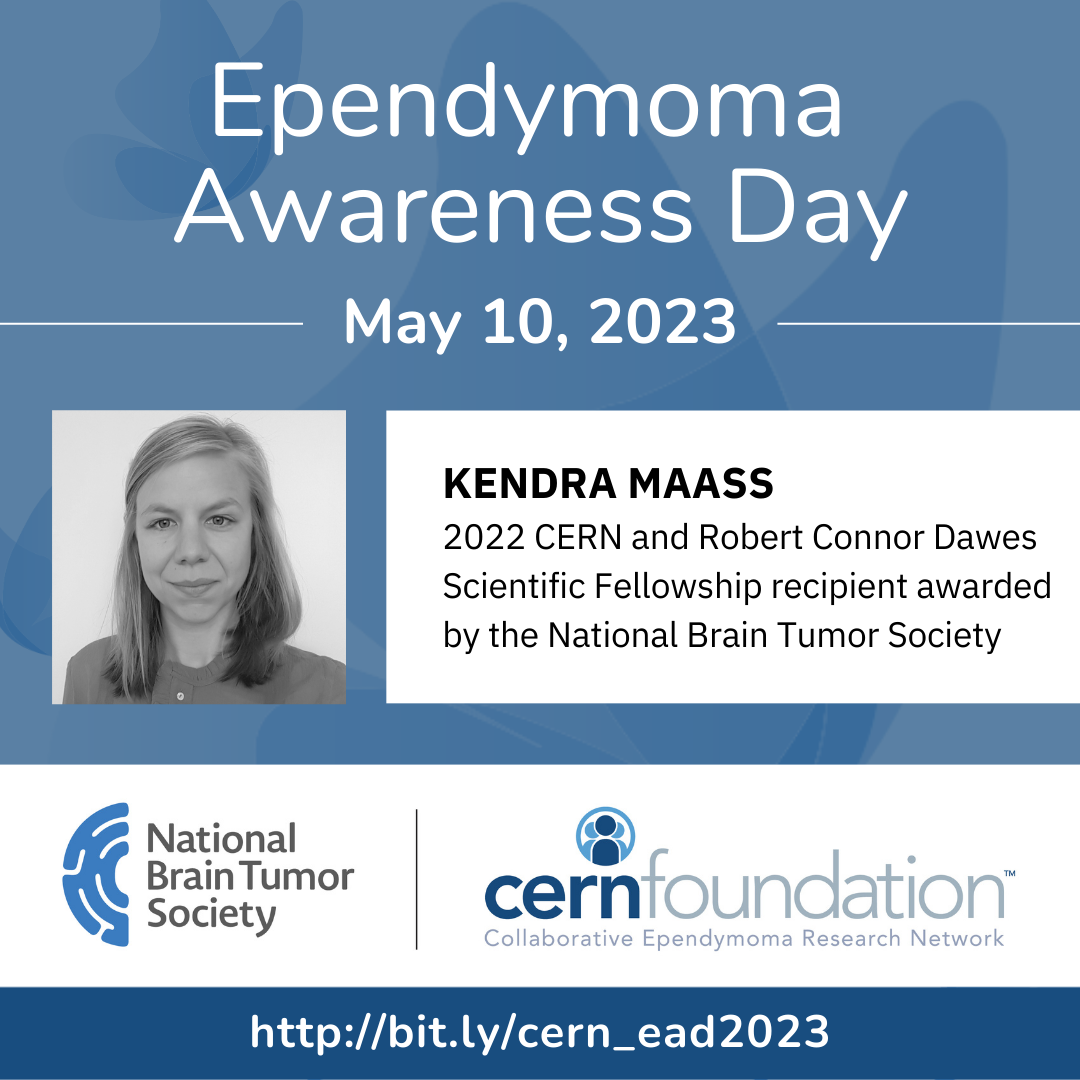Congratulations to Kendra Maass, the 2022 CERN and Robert Connor Dawes Scientific Fellowship Recipient
— Categories: CERN Research Articles Press Release Posted on January 25, 2022
Kendra Maass, from the Hopp Children's Tumor Center Heidelberg (KiTZ) and German Cancer Research Center (DFKZ), is the recipient of the 2022 CERN and Robert Connor Dawes Scientific Fellowship awarded by the National Brain Tumor Society. Research efforts will focus on unraveling the mechanistic dependencies of ependymoma tumor cells on extracellular vesicle pathways.
The fellowship award allows Maass to accurately study the mass transfer of brain tumor cells in children. For the project, Maass is investigating specific factors in the formation, release and uptake of so-called vesicles. These cellular components are used by tumor cells for transmitting information to specific cellular areas, their proximal surrounding (normal and cancer cells), but also via the blood to more distant body sites. Maass proposes to inhibit these pathways, suppressing the interactions of the most aggressive ependymoma tumor cells. Ependymoma are the third most common type of brain tumor in children and are particularly common in younger children. They often grow very aggressively and have a high risk of recurrence.
specific factors in the formation, release and uptake of so-called vesicles. These cellular components are used by tumor cells for transmitting information to specific cellular areas, their proximal surrounding (normal and cancer cells), but also via the blood to more distant body sites. Maass proposes to inhibit these pathways, suppressing the interactions of the most aggressive ependymoma tumor cells. Ependymoma are the third most common type of brain tumor in children and are particularly common in younger children. They often grow very aggressively and have a high risk of recurrence.
Enhancing Ependymoma Diagnosis and Prognosis
Under the fellowship, Maass will further will use blood tests, known as liquid biopsies, to identify markers for the diagnosis and prognosis of these childhood brain tumors. To do this, she will analyze vesicles released by ependymoma cells into the bloodstream.
“I am deeply honored to be awarded with the prestigious CERN and Robert Connor Dawes Scientific Fellowship which allows me to investigate the vesicular pathways as potential vulnerability in ependymoma and to designate my time to improve the outlook of ependymoma patients”, says Maass who conducts her research under the leadership of pediatric oncologist Kristian Pajtler from Hopp Children’s Cancer Center Heidelberg (KiTZ), German Cancer Research Center (DKFZ) and Heidelberg University Hospital (UKHD).
Improving the Understanding of Pediatric Ependymoma
“On behalf of the ependymoma community, I want to extend my sincere excitement in welcoming Kendra Maass to the fellowship program. Over the years, we have developed important relationships with the excellent clinicians and scientists at KiTZ in Heidelberg, Germany, through the support of various research efforts, community education and awareness programs, and as a trusted referral site for families seeking a second opinion in the EU and beyond”, Kimberly Wallgren, Executive Director of the CERN (Collaborative Ependymoma Research Network) Foundation, a program of the National Brain Tumor Society, emphasizes. Wallgren adds "We look forward to continuing those relationships and furthering our understanding of pediatric ependymoma through Maass’ research proposal.”
The international fellowship is open to researchers worldwide, the applications are therefore highly competitive. The fellowship is intended to advance research in the field of childhood brain tumors, especially with regard to the rather rare ependymoma. In partnership with the CERN Foundation, this named fellowship is supported by the Robert Connor Dawes Foundation. The RCD Foundation supports pediatric brain matters in the areas of research, care, and development and was created in 2013 in the memory of Robert 'Connor' Dawes. Liz Dawes, founder of the RCD Foundation commented “I was first introduced to CERN during Connor’s treatment and was in awe of the work they were doing to fight ependymoma. Since then we’ve had a fantastic working relationship and I’m very proud of the work we’ve been able to do together. I recognized a long time ago that a cure won’t come from one lab or even one country. We need as many brains as possible working together to fight this disease and that’s why global collaborations like this are so important.”
Maass Shares an Important Message on Ependymoma Awareness Day
"The Ependymoma Awareness Day is a great opportunity to talk about how we are taking the information of the genomics era to hopefully translate them into the clinic. Ependymoma is the third most common brain tumor in children, but despite improved diagnostic classification, the prognosis has not significantly improved over the last decades. The reason for that is the lack of genetic targets for known chemical compounds or drugs in ependymoma. Thanks to the generous support of RCD, NBTS and CERN, we have the possibility to look into single ependymoma cells and their specific characteristics. This novel technology helped us to identify proof of aggressive cells that communicate with the surrounding by small parcels called extracellular vesicles." Watch the video featuring Kendra's update.

